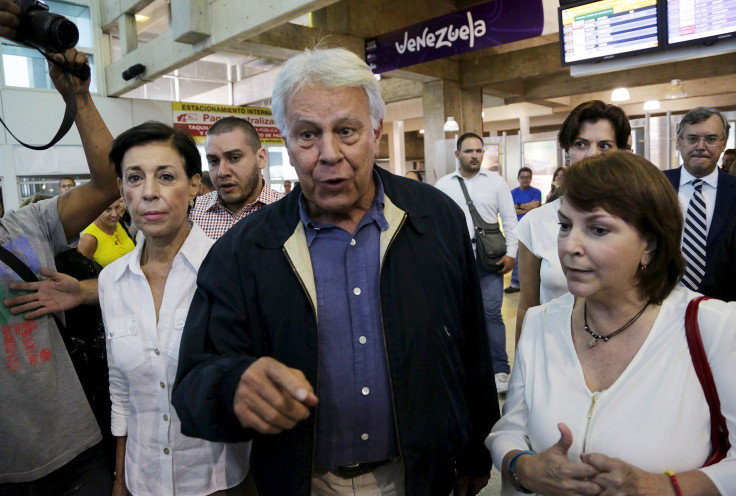Venezuelan Political Prisoners Get Boost From Spanish, Brazilian Politicians

Venezuela’s jailed opposition leaders received a show of support from abroad after Spain’s former prime minister, Felipe González, visited to assist the prisoners’ defense teams. But the visit further irritated the government of President Nicolas Maduro, which promoted a social media campaign to pressure González to leave.
González, who was prime minister of Spain from 1982 to 1996, arrived in Caracas on Sunday to meet with the families and defense teams of Venezuelan opposition leaders behind bars. Although González is a former lawyer, he said he would serve as an “external technical adviser” to the defense teams, as he can’t legally practice law in Venezuela. “We believe Venezuela lacks the dialogue to solve problems,” he told reporters after meeting with Caracas Mayor Antonio Ledezma, who is under house arrest on charges of conspiring against Venezuela’s government.
González is also meeting with defense lawyers and family members of Leopoldo López, another prominent opposition leader who has been jailed for more than a year on charges of trying to incite violence in last year’s mass antigovernment protests. López’s next trial hearing is scheduled for Wednesday.
González has had a testy relationship with Venezuela’s government, particularly in the wake of his vocal support for the dissidents. Earlier this year Venezuela’s National Assembly declared González unwelcome in the country for “trying to interfere in internal affairs,” and said the government would not provide him any support if he chose to visit. But that hasn’t barred González from going to Venezuela.
Instead, Maduro’s government chose another strategy to counter González, promoting a social media campaign with the hashtag #FelipeFueraDeAqui (“Felipe Get Out Of Here”). It became a top trending topic in Venezuela on Sunday. Meanwhile, Maduro reiterated criticism against González, saying via Twitter, “Venezuela’s affairs are ours, and only Venezuelans have the power to take them up. Our entire country rejects interventionism.”
González won’t be the only international figure to visit in support of the prisoners. Another delegation of Brazilian supporters, led by Brazil’s former presidential candidate Aecio Neves, is set to arrive June 17. “We will fill in for the shameful absence of President Dilma [Rousseff]’s government in the face of authoritarian escalation in Venezuela,” Neves wrote in remarks published in Brazil’s Folha de Sao Paulo newspaper Sunday.
López recently passed the two-week mark of a hunger strike to protest his detention. Daniel Ceballos, the former mayor of the western city of San Cristobal, is also on a hunger strike, and Venezuelan authorities said doctors are monitoring both prisoners’ health conditions. More than 30 Venezuelans have since joined the strike in solidarity with the prisoners, according to López’s and Ceballos’s Popular Will political party.
© Copyright IBTimes 2024. All rights reserved.






















